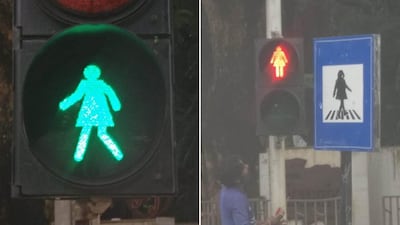Those taking a stroll through certain streets in Mumbai, India, may notice a change in the city's pedestrian signals.
The bustling capital of the state of Maharashtra has transformed some of its traffic light designs so that they show female stick figures, complete with a triangular dress shape, instead of the usual male figure.
The project is part of a broader initiative known as Culture Spine, headed by Aaditya Thackeray, cabinet minister for tourism and the environment in Maharashtra. He says it is a move to "ensure gender equality" in the country, but many say that it's just lip service.
Thackeray announced the change in a tweet that has since gone viral, with more than 3,100 retweets.
"If you've passed by Dadar, you'd see something that will make you proud. @mybmcWardGN is ensuring gender equality with a simple idea – the signals now have women, too," the tweet read.
Thackeray went on to thank the Brihanmumbai Municipal Corporation (BMC) assistant commissioner Kiran Dighavkar and others responsible for implementing the initiative in a subsequent tweet.
The city has reportedly installed 240 of the lights along a road in the Dadar neighbourhood of Mumbai.
The move has been hailed by supporters who believe it is a small but important step towards gender equality, making public spaces more inclusive of women.
Meanwhile, others feel like it is a token gesture that, in practice, does little to help women in the country.
Thackeray has since responded to the criticism saying that "each step matters".
While the initiative is a first of its kind in India, it has been done in other countries, including Australia and Germany.
In Melbourne, Australia, 10 female pedestrian figures were installed on traffic lights as part of a year-long trial in 2017. They had the same mixed reception, with one member of government calling the change a "practical and meaningful" move.
Think-tank member Evan Mulholland panned the scheme, however, describing it as "politically correct gesturing by policy makers that want to feel good about themselves".
Also in 2017, the "green man" was replaced by a silhouette of Kate Sheppard in streets in Wellington to celebrate the fact New Zealand was the first country to grant women the right to vote in 1893.


